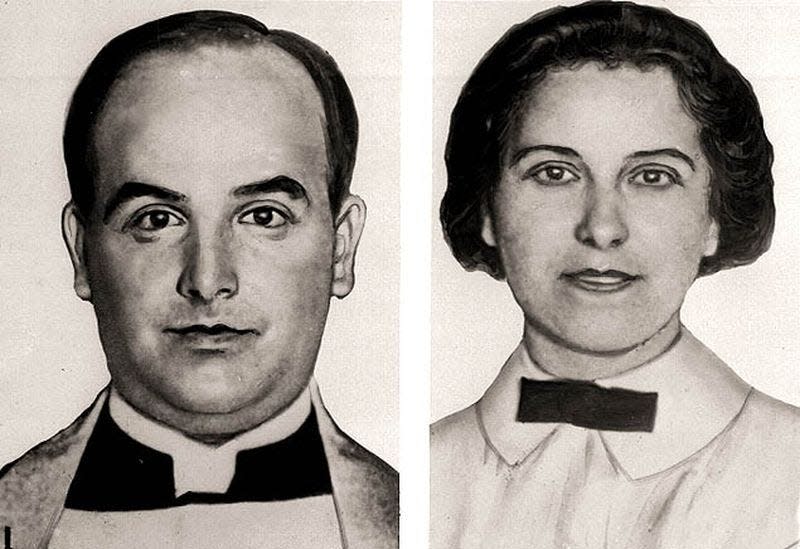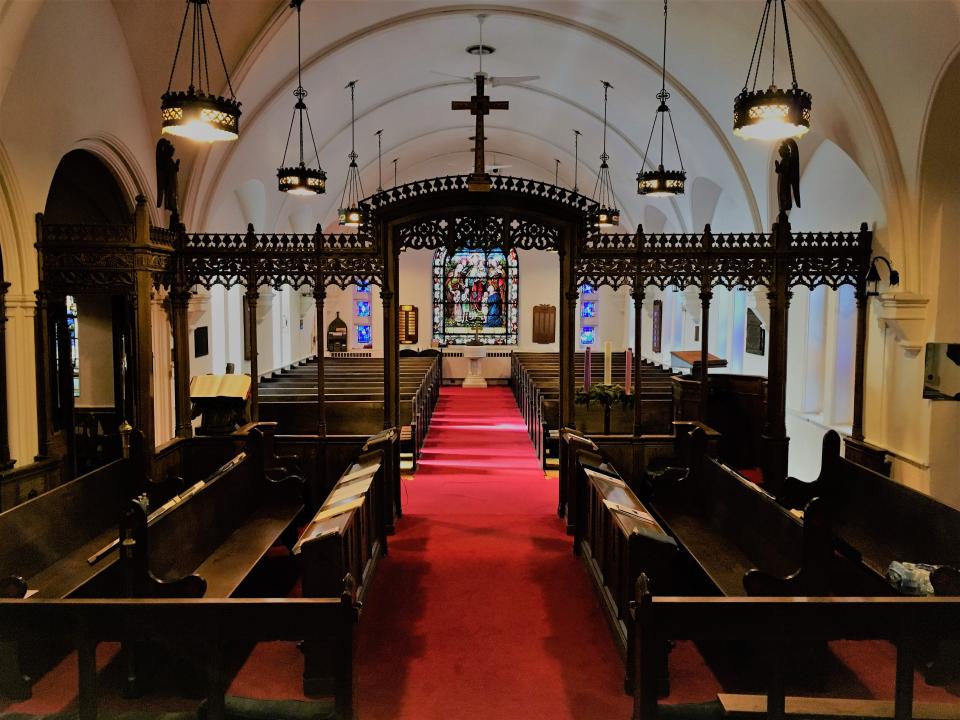Infamous Hall-Mills murders at 100: New production explores NJ cold case like never before
- Oops!Something went wrong.Please try again later.
The lovers were found dead beneath a crabapple tree – murdered and posed as if sleeping.
A century ago, on Sept. 16, 1922, the bodies of Reverend Edward Hall and church choir member Eleanor Mills were discovered on a farm in Franklin just across the New Brunswick border. Evidence of their affair − letters − were strewn about them in the area known as "Lovers' Lane." His business card lay at his feet.
The double homicide remains a cold case, though many have speculated the who and the why over the years. Thinkery & Verse artistic directors J.M. Meyer and Karen Alvarado, while not ignoring the unsolved aspect of the crime, are exploring its aftermath through their original production, "Thou Shalt Not: A Site-Specific Play about the Hall-Mills Double Homicide."

The veil between the past and present is thin there − actors sit in the same seats as their 1922 counterparts, the same hymns are sung, and the horsehair walls are those which witnessed the two lovers together.
Performances begin on Sept. 15, the day before the 100th anniversary, and run through Oct. 8, at the Church of St. John the Evangelist, 189 George St., New Brunswick. It's same church where Hall preached, and Mills sang, and where the two carried on their affair.
It is also the church that ostracized Charlotte Mills, the 16-year-old daughter of Eleanor Mills, after the murders when she just would not let the deaths rest.
"Thou Shalt Not" explores how the community was complicit in – or limited – the investigation and also examines the story from the perspective of Mills’ daughter.
Alvarado and Meyer are less interested in the murders. Instead, they explore the role of women in this Jazz Age society, the role of violence in a community and how a community responds to violence.
"We do talk about different theories," Alvarado said. "In fact, we actually stage five minutes of theories back to back to back to back to back, but we're less interested in finding the murderer as opposed to diving into the community's response to the to the murder. We're talking about both the community at St. John's, the church, the church members that she grew up with, that her mother was a part of, how they turned their back on her family. And then the wider community, as well and even when she went to New York, the notoriety of the murder − the murders followed her and so she was never be able to be able to be successful in other careers or on her own terms."
"And she died young and was ostracized by the community," Meyer said. "And that still happens to people who are the victims of violence. Oftentimes, we might have a moment where the community comes together for them. But as a culture, I don't think … I know we're not very good about dealing with grief and trauma, especially for young women. We're about people getting past things – not dealing with the fact that this is what happened to her."
The murders
The bodies of Hall, 41, and his girlfriend Mills, 34, were found near the end of the trolley line. Both had married older spouses; she to the underemployed church sexton, James Mills, and he to Frances Stevens Hall, an heir to the Johnson & Johnson fortune. Missing for two days, the couple, whose relationship was a poorly kept secret, had been dead for more than 24 hours when found.
The murder scene was staged. Mills was shot three times to the head, her throat slashed and voice box and tongue removed. The knife wound was covered by a scarf. Hall was shot once in the temple. His hat was placed on his head, as were his glasses.
In 1926, four years after the original investigation failed to indict anyone for the murders, Frances Stevens Hall and her brothers, Willy and Henry Stevens, were put on trial. Initially thought of as "simple" and "crazy," Willy Stevens was said to be the "star of the trial," while Henry Stevens was known as a "firearms expert." The case had been reopened because of new fingerprint evidence, an allegation of conspiracy and cover-up made by Hall's maid's husband during a divorce proceeding, and an appeal to Gov. A. Harry Moore by Charlotte Mills.
A Somerset County prosecutor, Arthur Simpson, was named a Special Prosecutor by the governor to the case, which had become a "cause celebre" once again.
The sensational "standing room only" trial at the Somerset County Courthouse in Somerville heard testimony from 160 witnesses, including the only supposed eyewitness Jane Gibson, who was known as the "Pig Woman." Two judges, Charles W. Parker and Frank Cleary, presided over the case. After the monthlong trial, Frances Stevens Hall and her brothers, defended by prominent attorneys Robert H. McCarter, Clarence Case and Timothy Pfeiffer — "the first million-dollar team" — were acquitted. The trial had been covered daily by more than 70 publications, unprecedented for the time.
The double murder has since been the focus of films and several books, both fiction and non-fiction, including one by legendary defense attorney William Kunstler who speculated members of the Ku Klux Klan were responsible for the murders.
'The murder church'
Alvarado and Meyer previously produced "Thou Shalt Not" in 2019 at St. John's to a sold-out audience, but they view this version as the actual premiere. More time and attention have been dedicated to this production, Meyer said.
"Over the past couple of years, we've just been doing more and more research and education projects about the different games at play," Alvarado said. "So we feel like it's just making the script much more in depth."
The couple got involved with the story by happenstance. While Alvarado was attending graduate school at Rutgers Mason Gross School of the Arts, their first child − a son Mateo, now 4 years old − was born. With her parents visiting, they thought it prudent to hold Mateo's baptism. A chaplain at Rutgers said he could perform the ceremony and to meet him at St. John's, a three-minute walk from their home.
"We must have walked by it 100 times not knowing what it was," Meyer said. "So the first thing we knew was that we were going to get Mateo baptized there and second, we learned that the church and congregation were connected with a ruthless double homicide."
"The words friends used. They said, 'Oh, the murder church'," Alvarado said.
The church was welcoming and beautiful, the two said. Once it was discovered the couple were artists, they were asked to produce plays there. In the few years they have been involved with St. John's, they have put on performances of Shakespeare and a transnational production of their critically acclaimed original play "Bride of the Gulf," which has also been presented at the Edinburgh Festival.

St. John's vestry now is comprised mainly of women who grew up in the church. The women said they were never allowed to discuss the murders growing up.
"But women don't silence violence against women," Meyer said. "And so, they were totally interested in talking about it. They wanted to know why they hadn't been allowed to talk about it, what really happened and what could they do about it now."
With many asking if Meyer and Alvarado were going to do a play about the Halls-Mills murders, the couple didn't agree until they "understood a different way of going about it." They told the church they would be honest in their thoughts and perspectives.
"They agreed 100%," Alvarado said. "They were open to us looking at it with a bit of scrutiny. That's been really important to us, and they've been very helpful. For instance, they let us look at all of their archives. They have 90 documents from the 1920s − all of their vestry meeting notes and things of that nature. Without these, we wouldn't have been able to get the level of detail we did without looking at all of those original documents."
"This is a story really about Christians behaving badly," Meyer said. "And we wanted to make sure we could be allowed to say that because that's what happened. The congregation about well, they may not have done the murders. But it is very possible they did. They certainly helped cover it up, and they certainly ostracized Charlotte afterwards. And they cultivated an environment of abuse even before the murders."
A cast reflective of today's Hub City
The 12-person cast of "Thou Shalt Not" is comprised mainly of actors from Mason Gross and is reflective of the diversity of the community now, not how it was in 1922. The man who portrays Edward Hall is a Black actor named Lazarus Simmons; the actress who plays Charlotte Mills, Madhu Murali, is South Asian; and another actor, Andrew Banbridge, is a little person.
"That was important to us because we want to see the New Brunswick community today reflected in this play," Meyer said.
Rounding out the cast is Kaitlin Ormerod Hutson reprising her role as Eleanor Mills, and Meyer is taking on the role of James Mills, Eleanor Mills' husband. Alvarado is directing and performing a few cameo roles.
"There is nobody left alive from that time," Alvarado added. "There's not a lot we can do for those people. So what we want to do is take care of the people in New Brunswick today. And help them think about the violence. And the women in the community. So because of that, we strive for the highest level of diversity in the cast, so there's gender diversity and a lot of ethnic and cultural diversity and differently-abled."
Ironically, Meyer also has become a de facto sexton at the church, doing repairs and odd jobs.
"I think one of the main things is that by 'site specific,' you are walking, working in these spaces that these victims worked, worshiped, had their affair," Alvarado said. "It's a living piece of history."
During the pandemic, Meyer and Alvarado, co-founders of Thinkery & Verse, teamed with Butch Mermaid to create a geocaching project based on "Thou Shalt Not." This version − “GHOST HUNT: The Hall-Mills Double Homicide” − is an international free, multiplatform adventure. Participants can hunt for clues at physical sites connected to the crime related and listen to a theatrical production of the double murder. All the audio stories also can be accessed at thinkeryandverse.org for those unable to visit the geocache locations.
"Thou Shalt Not" will be performed Thursdays, Fridays and Saturdays at 7:30 p.m. at the Assembly Hall of St. John's, 189 George St, New Brunswick. Tickets start at $45 and are available at bit.ly/3D740Jo. Tickets can be purchased at the church, 30 minutes prior to the performance.
email: cmakin@gannettnj.com
Cheryl Makin is an award-winning features and education reporter for MyCentralJersey.com, part of the USA Today Network. Contact: Cmakin@gannettnj.com or @CherylMakin. To get unlimited access, please subscribe or activate your digital account today.
This article originally appeared on MyCentralJersey.com: Cold case NJ: Hall-Mills murders examined in new production

